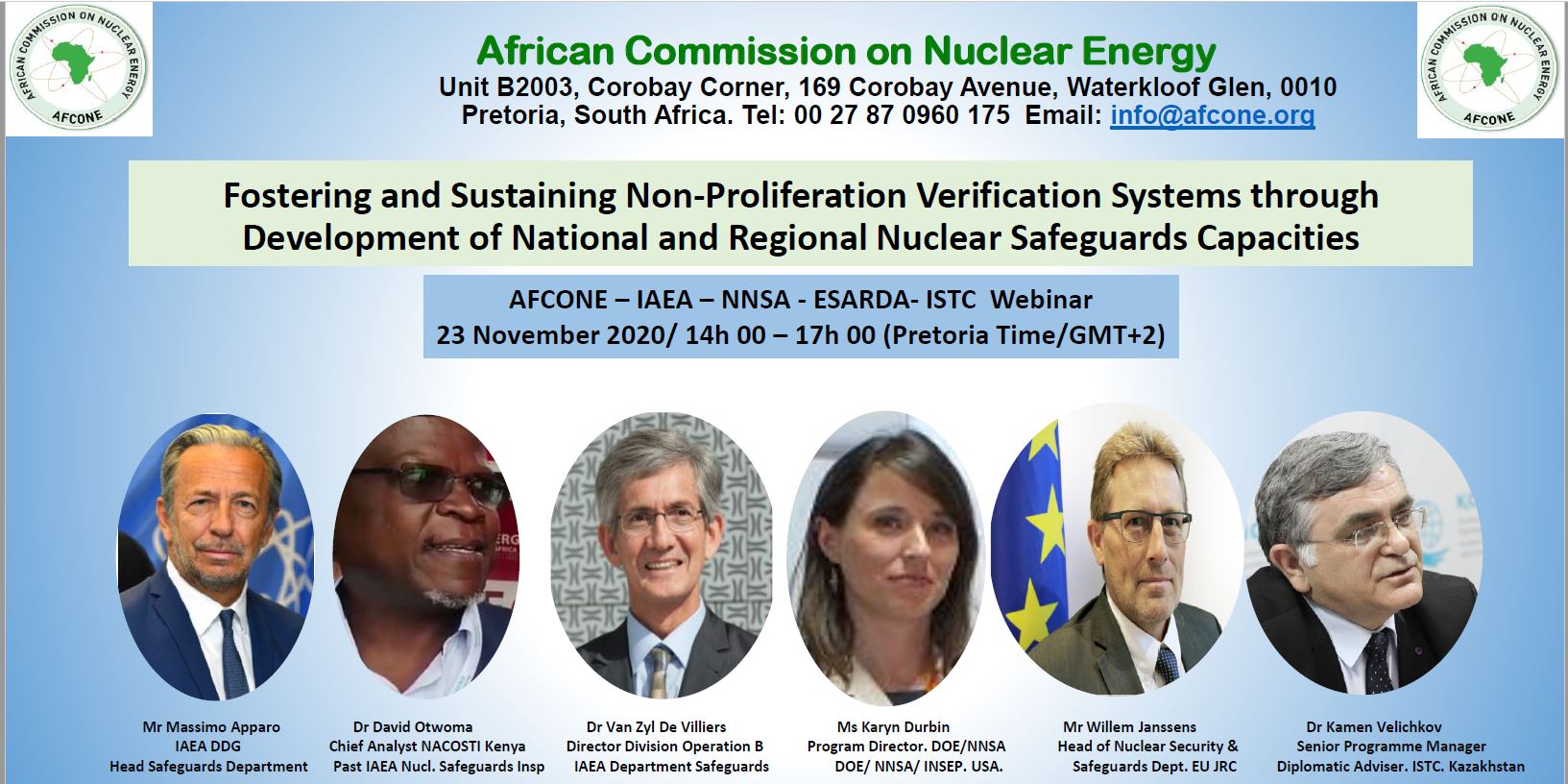ISTC Partners with AFCONE, IAEA, ESARDA and INSEP to Help African Partners Strengthen their Nuclear Safeguards

On the initiative of the African Commission on Nuclear Energy (AFCONE) several international organizations convened on 23 November 2020 an online seminar on the topic: Fostering and Sustaining Non-Proliferation Verification Systems through Development of National and Regional Nuclear Safeguards Capacities. AFCONE teamed up for this event with the IAEA Department of Safeguards; the U.S. DOE/NNSA International Nuclear Safeguards Engagement Program (INSEP); the European Safeguards Research and Development Association (ESARDA) and ISTC. The seminar attracted the participation of approximately one hundred African experts.
The underlying rationale for the event was that both the Nuclear Non-Proliferation Treaty and the African Nuclear Weapon Free Zone Treaty (Pelindaba Treaty) require State Parties to conclude comprehensive safeguards agreements (CSAs) with the IAEA. Various African Union Member States and Pelindaba Treaty State Parties with CSAs in force (some also with small quantities protocols or additional protocols) require assistance in establishing and improving their State Systems of Accounting for and Control of Nuclear Material (SSACs) to effectively fulfil their obligations in accordance with such Agreements and Protocols.
The role of AFCONE was outlined in both the welcoming remarks by Messaoud Baaliouamer, AFCONE Executive Secretary, and the introduction by the moderator, Dr David Otwoma, Chief Analyst, NACOSTI, Kenya. To ensure compliance with international safeguards obligations the AFCONE aims at optimal synergies of internal assets and external assistance. To encourage regional cooperation on the continent AFCONE intends to select and designate African Regional Collaborating Centres to lead the scientific and technical programs. Two of the candidates – the Moroccan Agency for Nuclear and Radiological Safety and Security and its Algerian homologue – presented their training potential.
On its part IAEA stands ready to provide support for Africa, as stated by IAEA Deputy Director General Massimo APARO and Dr Van Zyl De Villiers, IAEA Safeguards Operations Division Director. Last September the IAEA launched, a comprehensive capacity building initiative for SSACs, named the COMPASS Initiative. In a pilot project five states receive assistance tailored to their specific needs to strengthen their poorly-mandated and under-resourced national authorities. Rwanda is among these states, a small African country which ISTC supported in the last three years in the field of nuclear and radiological security.
Ms. Karyn Durbin, Director, INSEP and Dr Willem Janssens, ESARDA Chair, EC Joint Research Center, presented the opportunities, that the US and the EU, respectively, offer as capacity building support for safeguards implementation. While the US designs its training programs primarily for professionals that have already embarked on a nuclear career, the educational programs of the EU reach out to diverse audiences that include also research communities and universities. The JRC course on safeguards carried out at Ispra annually is an ample illustration pf that approach. Several young African experts were among the trainees of the course.
Based on their bilateral Memorandum of Cooperation, AFCONE and ISTC cooperate successfully in the in Africa. Currently ISTC implements two EU-funded projects covering a total of 22 countries, namely: Support to Southern African States in Nuclear Safety and Safeguards; and Support to the Centre of Excellence of Eastern and Central Africa in Nuclear Security. The objectives of the first of them include provision of support to the regional approach to nuclear safety and safeguards by the SADC Member States, while the second comprises safeguards modules in the trainings that were offered to more than three hundred African experts. Thus the subject matter of safeguards, is one of the thematic areas in which ISTC provides interested African partners with expert advice and technological innovations.

